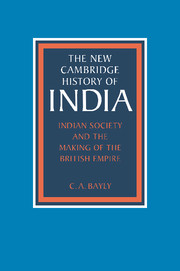Book contents
- Frontmatter
- Introduction
- 1 India in the eighteenth century: the formation of states and social groups
- 2 Indian capital and the emergence of colonial society
- 3 The crisis of the Indian state, 1780–1820
- 4 The consolidation and failure of the East India Company's state, 1818–57
- 5 Peasant and Brahmin: consolidating ‘traditional’ society
- 6 Rebellion and reconstruction
- Conclusion: the first age of colonialism in India
- Glossary of indian terms
- Bibliographical essay
- Index
- THE NEW CAMBRIDGE HISTORY OF INDIA
- Plate Section"
- References
3 - The crisis of the Indian state, 1780–1820
Published online by Cambridge University Press: 28 March 2008
- Frontmatter
- Introduction
- 1 India in the eighteenth century: the formation of states and social groups
- 2 Indian capital and the emergence of colonial society
- 3 The crisis of the Indian state, 1780–1820
- 4 The consolidation and failure of the East India Company's state, 1818–57
- 5 Peasant and Brahmin: consolidating ‘traditional’ society
- 6 Rebellion and reconstruction
- Conclusion: the first age of colonialism in India
- Glossary of indian terms
- Bibliographical essay
- Index
- THE NEW CAMBRIDGE HISTORY OF INDIA
- Plate Section"
- References
Summary
The British had been drawn into the politics of coastal India by lust for profit and the intricate connections between markets in produce and markets in revenue and political perquisites. The need to control the conflicts of a society in the process of rapid change forced them to elaborate their own style of Indian government. Their success at the art of combining the sale of military services with entrepreneurship in the management of cash revenues embroiled them further in indigenous society. But Indian powers were not hypnotised victims of the cobra's strike. Those which drew on the strength of the subcontinent's tradition of military sultanates and mobilisation of peasant warriors, notably Mysore, the Marathas and the Sikhs, remained a challenge. For these states also had the capacity to put together flexible combinations of cash and men. Moreover, the changes which these martial régimes wrought on rural India were as much formative influences on the Company's nineteenth-century empire as the British revenue settlements. This chapter examines the working out of the processes of expansion both of the British and of the last independent Indian states. First though, it turns to the new pressures on the Company's Indian establishments which finally forged a European military despotism out of the loose congeries of independent mercantile corporations and creole armies which it had been in Hasting's time.
Richard Wellesley's period as Governor-General (1798–1805) represented a new phase of British imperialism in India. The ambition of the Wellesley ‘family circle’ – his brothers Henry and Arthur along with an assortment of younger military acolytes and Orientalists – was strident.
Keywords
- Type
- Chapter
- Information
- Indian Society and the Making of the British Empire , pp. 79 - 105Publisher: Cambridge University PressPrint publication year: 1988
References
- 1
- Cited by

